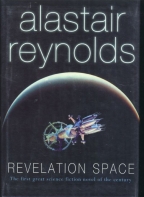
Revelation Space
Alastair Reynolds
614 pages
published in 2000
Alastair Reynolds' is the Netherlands most famous science fiction writer --even if he is British. He works for the European Space Agency in Noordwijk and has lived here since 1991 you see, which may not make him Dutch but it sure means we'll claim him as a writer. If Canada can claim everybody who has even flown over the country as one of their own, so can we. Revelation Space is his first novel; I'm not sure why I didn't pick it up earlier. Reynolds started getting published in the early nineties, in Interzone and later became a regular in Gardner Dozois' Year's Best Science Fiction anthologies. It is therefore not a great surprise that his first novel is remarkably accomplished with none of the weaknesses of the typical first novel.
Revelation Space itself is an attempt to write semi-realistic Space Opera, without the miracle technology and artifacts of classic space opera, which mainly means no faster-than-light space travel. There's still plenty of other, more "political correct" miracle technology on display though, like artificial intelligence, nanotech and handwaved quantum mechanic stardrives. Each of these technologies may be just as unlikely or be breaking as many laws of physics as FTL travel, but those haven't been fetishised as taboo, you see.
All sarcasm aside, Revelation Space is at the very least an example of a lived in space opera that you don't get to see very often. No gleaming mile long starships crewed by cleancut heroes crisscrossing the galazxy here. None of Reynold's protagonists can really be labelled heroes and in general his future has the same sort of gritty feel as we saw in the Alien movie, or for that matter in M. John Harrison's The Centauri Device which I had read only a few weeks before this. Reynolds is fortunately much less slit-your-throat pessimistic than Harrison however.
The plot of Revelation Space revolves around that old chestnut, the Fermi paradox: where are all the aliens? Humanity is busy establishing a presence amongst the stars, has moved out of the Solar System but still hasn't encountered any true aliens, though it has found plenty of archeological remnants as well as the odd enigma here and there. The most interesting of those remains are on the planet Resurgam, where an alien race called the Amarantin used to live until their sun went kabloei. The leader of the archealogical dig, Dan Sylveste, a scion of an old and powerful family from the Yellowstone system, is convinced within the Amarantin ruins lies the clue as to why there are no living aliens around anymore.
Meanwhile in Yellowstone, mercenary soldier Ana Khouri who ended up in the wrong system thanks to a cleric error is doing what she can to stay alive. She's hired by a mysterious power to travel to Resurgam and assasinate Sylveste, traveling there on the stolen starship Nostalgia for Infinity, crewed by three completely psychotic cyborgs still loyal to their Melding Plague wracked captain. The Melding Plague being what brought down Yellowstone, once the greatest of all human colonies, now a sad ruin as its nanotech technology as well as those who had augmented themselves with it was infected with this plague, making it grow out of control. Int he captain's case, he has literally become one with his ship. Of the three crew members, we follow Triumvir Ilya Volyova, the most sane but also the most ambitious, as she attempts to take control of the ship and its cargo of near-sentient superweapons.
Once the Nostalgia for Infinity reaches Resurgam the plotlines come together and it's revealed why Sylveste's archeological research is of more than academic research and why people want to kill him for it. Let's just say that Sylveste is another in a long line of science fictional scientists whose desire for knowledge is less than advisable considering their research subjects. As you may have suspected by now, the reason the Amarantin died is no accident and it of course ties in with the paucity of alien contacts in general. Revelation Space's finale is a classic moment of conceptual breakthrough as the reality of the universe is revealed, in a manner that reminded me of a similar novel, Paul McAuley's Eternal Light. At this point the novel does lose much of its grimy realism and gets all metaphysical on us, which I wasn't completely happy with; the journey was better than the destination. Nevertheless this was a great first novel, promising much for the future.